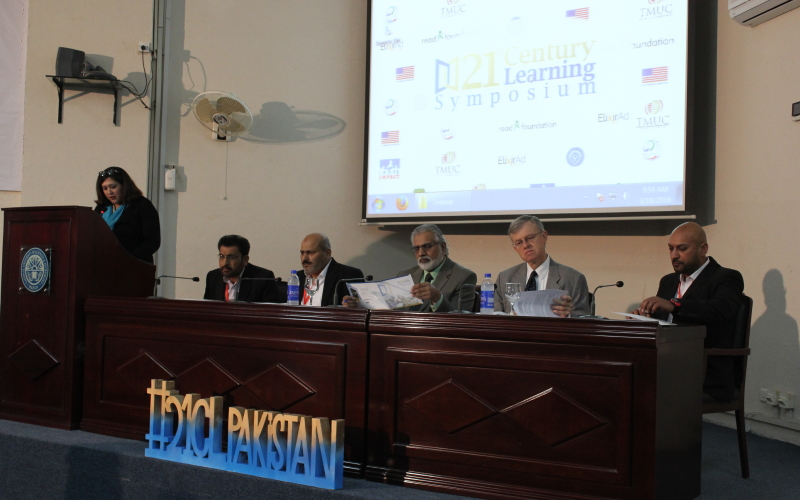By Rimsha Ali Shah.
“As an educator from Pakistan’s higher education sector, this symposium has helped me learn the cutting-edge technologies and pedagogies that are out there,” said Tanzeel, an attendee of the first ever international conference for educators in Pakistan. Addressing these key developments in an age of education revolution was the primary theme of the 21st Century Learning Symposium, held on March 19, 2016 at the National University of Science and Technology (NUST). The symposium was organized by Youth Impact to empower local educators with 21st century learning methodologies and technologies through a day of interactive, focused, and targeted workshops with local and international trainers. The man behind this vision is International Visitors Leadership Program (IVLP) alumnus, Abdul Samad Khan. The symposium was made possible with the help of the alumni small grant from the Pakistan-U.S. Alumni Network (PUAN). All alumni of various U.S. government sponsored exchange programs in Pakistan are eligible to apply for the grant of up to $5,000 USD to enable them to give back to their communities.
The symposium brought together 150 educators from across Pakistani higher education institutes, including professors, lecturers, curriculum developers, corporate trainers and administrators. Applying innovative and tech savvy approaches to classroom teaching was an underlying theme of the symposium. Jeffery Sexton, Minister Counselor for Public Affairs, U.S. Embassy Pakistan, underscored the theme in his keynote remarks, “With nearly 65 percent of Pakistan’s population under the age of 30, investing in education is critical to the future of this country. As educators, you play a crucial role in helping students gain skills and knowledge to realize their full potential as innovative, productive members of Pakistani society.”
Addressing Questions of Innovation and Engagement
“Give the pupils something to do, not something to learn. The doing is of such a nature as to demand thinking – learning naturally results,” said John Dewy, an educational reformer whose ideas have been influential in education.

Nisar Moosa during his talk
The workshops revolved around this very concept of shifting the paradigm of teaching to more practical, hands-on approaches that integrate innovative practices through the use of technology, in order to be on par with the world’s leading knowledge economies. Nisar Moosa, Director of Innovative Learning for Youth Impact, stressed the need to proactively engage students in the learning process, “We need to instill curiosity in students, not just facts. Students need real life experiences … from knowing to doing!”
Huma Ayub, Assistant Professor at Fatima Jinnah Women’s University commented, “Innovation is presently the most important factor for us as educators. The better you are equipped with ideas, the better equipped your students are. This is why in higher education, technology and innovation play a pivotal role.”
Participants also had the opportunity to learn from two international trainers, Bernie Kelly, CEO of Global Immersion Australia, and Roger Greenaway, CEO of Active Reviewing, U.K. Greenaway’s session dissected the teaching methods deployed by the participants in their respective roles as educators. For Saba Hameed, Assistant Professor at International Islamic University of Islamabad, the session was eye-opening in terms of the diversity and innovations deployed locally and internationally for teaching students. “My purpose of attending the symposium was to learn effective strategies to engage my students and the sessions have been quite informative and helpful.”
Kelly’s workshop: “You don’t teach Maths … you always teach life through Maths!” highlighted experiential learning and social networking as tools to pique students’ interest toward a proactive classroom environment and empowered educators in developing competencies that match the fast pace of growth and innovation.
As chief guest, Engineer Muhammad Asghar, Rector NUST said, “This is the era of human empowerment. There is a dire requirement of systems-thinking approach for cross-fertilization of ideas.” The day-long event provided participants with the ripe environment for educational innovations and as Dr. Saira, Assistant Professor at National University of Modern Languages (NUML) expressed, “This has been a wonderful occasion for sharing ideas and re-energizing ourselves as educators.”
To view more photographs from the opening ceremony, click here.

